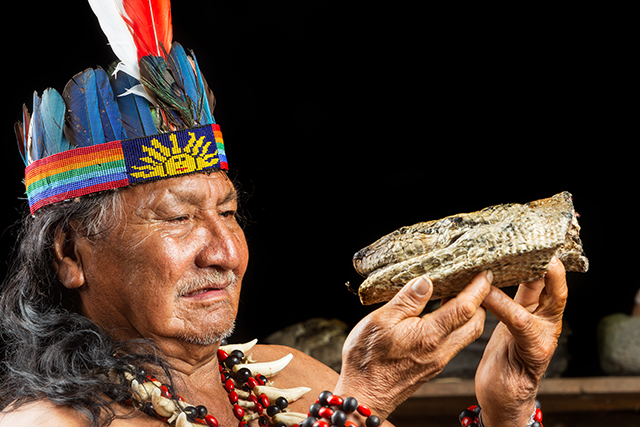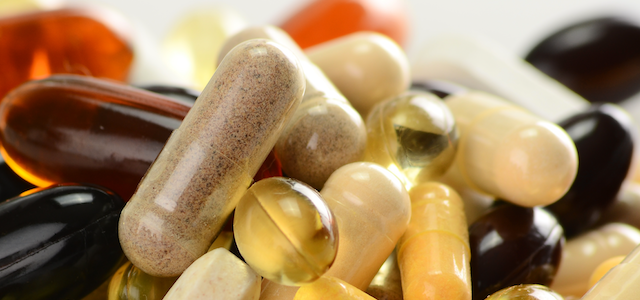Here’s what you need to know about ayahuasca, the natural (and psychedelic) antidepressant
10/18/2019 / By Isabelle Z.

Perhaps you’ve heard tales of people visiting South America and trying ayahuasca. This psychoactive brew is said to be very enlightening, but what exactly is it – and is it safe?
Ayahuasca is a tea made with the leaves of a plant called Psychotria viridis and the stalks from a vine known as Banisteriopsis caapi. Sometimes other ingredients and plants may be added.
The psychedelic substance in P. viridis is called DMT, and it is responsible for much of the effect the tea has. It’s combined with the B. caapi to enhance its effects and boost its bioavailability.
Although the sudden buzz it’s been getting might make you think it’s new, it is actually centuries old. It was used by ancient tribes in the Amazon for religious and spiritual purposes, and some religious communities in places like Brazil still use it as a sacred beverage.
There’s also a ceremonial component, with a shaman or “curandero” responsible for preparing the brew and leading the ceremony. The vine is cleaned and then smashed up prior to boiling to facilitate the extraction of its medicinal compounds. After boiling and reducing the concoction, the water is set aside, and the process is repeated using the remaining plant material to create a highly concentrated liquid.
What happens when you take ayahuasca?
The tea affects your central nervous system and brings you to an altered state of consciousness. This typically includes hallucinations, euphoria, and even out-of-body experiences. Some people will also experience paranoia and fear.
It generally kicks in within 20 to 60 minutes of consuming it, and the trip it induces can last for as long as six hours. Many people experience vomiting and diarrhea along with the psychological effects, and this is said to be part of the “cleansing” experience.
It affects everyone differently, but many people say its effects are both positive and negative. Users report that it helps them to heal from past traumas and open up their minds in a new way.
Is it legal?
While many of the plants used for brewing ayahuasca are legal in the U.S., one of its main active ingredients, DMT, is considered an illegal Schedule I drug. However, it can be obtained legally for research purposes upon getting approval from the FDA and DEA.
Many people travel to other countries to participate in ayahuasca ceremonies. In places like Costa Rica, Brazil, and Peru, tourists often sign up for ayahuasca retreats, but this is not regulated and there is no guarantee an experienced shaman will be running the event. There have been reports of the brew being adulterated with dangerous drugs in some places.
Those who wish to experiment with ayahuasca are advised to do their research and bear in mind there is no guarantee it will be safe. People who take antidepressants and some other types of medications should not try ayahuasca.
Are its benefits proven?
DMT and beta carbolines, the main active ingredients in the brew, have demonstrated neurorestorative and neuroprotective qualities in scientific studies. DMT can protect brain cells from damage, while beta carboline has memory-boosting and anti-inflammatory effects.
It has also exhibited strong antidepressant effects. In one study, a single dose of it brought about significant improvements in the severity of depression in those suffering from treatment-resistant depression, while several other studies have proven its utility in treating depression, mood disorders, addiction, and anxiety.
Further studies are underway, and they could potentially lead to new treatments for depression. The current standard treatment, antidepressants, is associated with a slew of dangerous side effects, so a treatment that could safely help the 300-million-plus people around the world who are grappling with depression is sorely needed.
Sources for this article include:
Tagged Under: alternative medicine, ayahuasca, beat depression, depression, depression treatment, mental health, natural antidepressant, natural cures, natural medicine, plant cures, plant medicine, prevention, psychedelics, research, shamans, South America, tea
RECENT NEWS & ARTICLES
COPYRIGHT © 2017 BEATDEPRESSION.NEWS
All content posted on this site is protected under Free Speech. BeatDepression.news is not responsible for content written by contributing authors. The information on this site is provided for educational and entertainment purposes only. It is not intended as a substitute for professional advice of any kind. BeatDepression.news assumes no responsibility for the use or misuse of this material. All trademarks, registered trademarks and service marks mentioned on this site are the property of their respective owners.



















